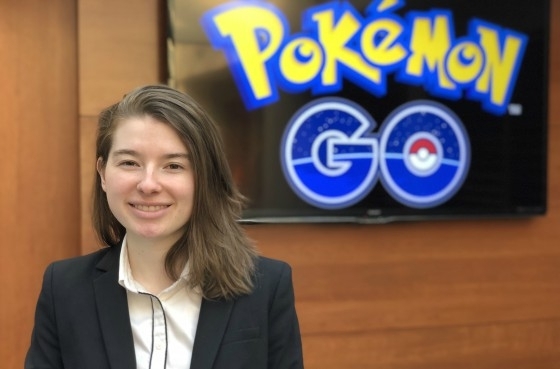
What were you doing on July 6, 2016?
If you were like millions of people around the world, you were frantically downloading the augmented reality game Pokémon Go to your mobile device and then heading into the wilds of your neighborhood to locate, capture, battle, and train virtual creatures.
Colleen Signorelli remembers the excitement. “My older brother was an avid gamer, and I always wanted to do everything he did, so I started playing video games at a young age,” she says. “I also grew up loving Pokémon, as did a lot my Jersey shore hometown friends. When Pokémon Go was released the summer before I started law school, we were all excited to try it out and we’d meet up once or twice a week to go Pokémon hunting. The game itself was quite fun, but the biggest draw for me was playing as a group.”
As the summer wound down, Signorelli left for St. John’s Law, following in the footsteps of her father, Paul Signorelli '81, and “forgetting about most video games until finals ended.” She excelled academically, earning a spot on the St. John’s Law Review. Then came the circle back to her recent summer pastime. “I was thinking about note topics and, on a whim, I did an online search for Pokémon Go and stumbled upon Candy Lab, Inc. v. Milwaukee County,” says Signorelli.
The case involved a county ordinance that required mobile app developers to obtain park permits before they could release any location-based augmented reality video games into Milwaukee County parks. A company that wanted to release its game motioned for a preliminary injunction against enforcement of the ordinance, which the court granted, finding that the game qualified for First Amendment protection and that the ordinance was likely unconstitutionally vague. “Once I read this case, I knew I wanted to write about it,” Signorelli says.
Advised by Professor Jeremy Sheff, founding director of the Law School’s Intellectual property Law Center, she completed her note, "Augmenting Our Reality: The (Un)Official Strategy Guide to Providing First Amendment Protection for Players and Designers of Location-Based Augmented Reality Video Games,” for publication in the February 2019 issue of the St. John’s Law Review. In it, Signorelli analyzes First Amendment constraints on municipalities that attempt to regulate the playing of location-based augmented reality video games on public property.
“The most surprising realization I came to while researching and writing my note was that, theoretically, individual gamers could have less First Amendment protection than groups of gamers,” Signorelli shares, adding, “The act of playing is expressive conduct, but when gamers play in a group, they’re suddenly assemblies or associations. Generally, expressive conduct has less protection under the First Amendment than freedom of assembly. Following that logic, individual gamers would have less protection than groups of players.”
Signorelli’s note not only merited journal publication, it took first place in the inaugural Video Game Bar Association Writing Competition. The judging criteria included the overall quality of the paper, the significance of the topic to the field, the originality and creativity of the topic treatment, the quality of analysis, and the technical quality of writing. The win comes with a $2,500 stipend plus a trip to Los Angeles to attend the VGBA Summit this month. “I feel elated,” Signorelli says of the achievement. “It’s wonderful to receive this recognition for my work at the intersection of law and technology, and I look forward to building on this foundation as I finish my legal education at St. John’s and move into the profession.”
